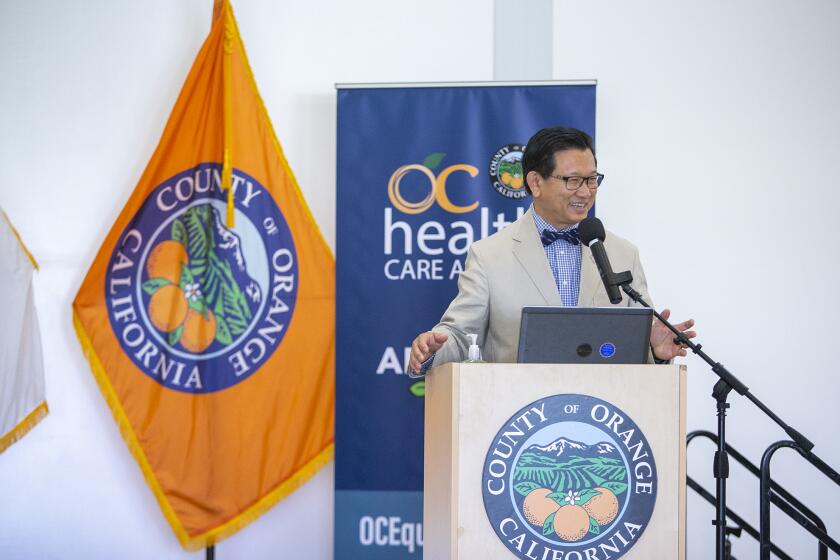Community groups criticize Newsom for omitting health equity funds

- Share via
Gov. Gavin Newsom is facing criticism from community organizations after he declined for the second straight year to provide money in the state budget for a proposed fund aimed at advancing health equity and racial justice.
Supporters of the proposed Health Equity and Racial Justice Fund had called on Newsom to allocate millions of dollars to support community-based groups, clinics and tribal organizations offering services and programs to address health disparities.
This year, the Senate and Assembly proposed $75 million in ongoing annual funding for the Health Equity and Racial Justice Fund. But funding was left out of the $307.9-billion budget finalized last week for fiscal year 2022-23, which began Friday.
The idea for the fund came along last year but was not funded in the 2021-22 budget. Although other forms of state and county grant opportunities exist for community organizations and tribal groups, advocates for the Health Equity and Racial Justice Fund consider it a unique way for state officials to administer and support their efforts to tackle access to care, employment, transportation, violence prevention and criminal justice.
More than 200 organizations have publicly backed the fund.
But they said that Newsom’s failure to allocate money, particularly with a $101.4-billion surplus, reflects a lack of effort on his part to take bold steps on racial justice, noting that he has held off declaring racism a public health threat.
The new $307.9-billion budget includes $9.5 billion in gas refunds, $1.4 billion in utility payment assistance and funding to combat climate change, among other items.
More than 240 cities, counties, states and health-related associations and departments have made the declaration since 2020, according to the American Public Health Assn, which tracks the data.
A spokesperson for the governor did not directly address the decision not to provide money to the fund, or the resulting criticism.
In a statement, the governor’s office said the new budget “makes history by expanding Medi-Cal for all income-eligible Californians, regardless of immigration status, and proposes another $200 million specifically to expand access to reproductive health services while strengthening protections. That’s on top of the governor’s inflation relief proposal,” which will provide as much as $1,050 to California families.
Sonya Young Aadam, chief executive of the California Black Women’s Health Project, a nonprofit based in Inglewood, said the statement confirmed her concerns that Newsom has “a very serious lack of real focus or interest in things that are driven and rooted in racism.”
She said it is “a slap in the face” to see the governor not taking active steps to address the causes of inequities or provide money to help community-based organizations address racial disparities in health, housing, criminal justice or education.
Her organization does programming and community partnerships to support Black women with maternal and reproductive health, mental health and training to be health advocates.
“I was counting on that, and not just for the organization that I manage but counting on it for the full spectrum of organizations out there who are doing this heavy lift, and who are filling these gaps,” Aadam said. “Certainly Black women I know, who are running organizations ... we make tremendous sacrifices to do the work that we are doing, and we grovel for the support to be able to continue this work and it’s unacceptable.”
She said Newsom’s decision only makes it more challenging for groups like hers to provide services and programs, particularly as an organization focusing on Black communities. Community-based groups are often competing for the same pools of limited grant and governmental funding that cannot always be relied upon long-term.
“If I were running an animal shelter, we’d be so much better funded,” Aadam said. “It wouldn’t even have to be a statewide animal shelter, it could be a local one in a small city, and it would be better funded than the work that we’re doing.”
Doreena Wong, policy director for Asian Resources Inc., a Sacramento-based group focused on helping AAPI communities, said she was disappointed and frustrated when she found out the Health Equity and Racial Justice Fund didn’t receive money again.
She said her group serves more than 35,000 people a year with medical assistance, language access and food and housing aid. More funding, she said, particularly “a tiny fraction” from the budget that the health equity fund proposed, would help more community organizations — often the most trusted groups in underrepresented communities — directly address systemic issues.
“It doesn’t seem like even much of a commitment to really support all of our [community organizations] that are doing this critical work,” Wong said. “I’m truly disappointed that he refused to fund grassroots kind of solutions to some of these systemic issues.”
Advocates have also expressed concern that Senate Bill 17, from state Sen. Richard Pan (D-Sacramento), did not get through the legislative process this session.
After the pandemic revealed social and health inequities, Orange County is aiming to identify and reduce the long-standing disparities.
The bill would establish a state Office of Racial Equity to help develop statewide strategies for advancing racial equity across various agencies.
“My team and I are moving SB-17 through the legislative process, currently continuing to meet and work with all stakeholders to advance systemic racial equity and justice in California,” Pan said in a statement. “I plan to finish this work to send SB-17 to the governor’s desk for signature later this year, and I celebrate the advancements for equity already realized in the historic 2022-23 budget.”
Ronald Coleman, managing director of policy for the California Pan-Ethnic Health Network, said the lack of funding is a missed opportunity for Newsom, particularly since “people of color have consistently supported [him] in his first election and certainly saved him in his recall.”
He said that while state and local government agencies have attempted over the years to address health equity, there has not been enough funding made available to community organizations already on the ground and connected to populations that need help. He noted that more than 200 organizations supported the Health Equity and Racial Justice Fund.
“We do not see Gov. Newsom stepping up and making strong investments, particularly as it relates to racial justice, for communities of color,” Coleman said. “Certainly California, as a state has benefited from institutional and systemic racism that has impacted communities for hundreds of years and we think California being complicit needs to invest state and resources to turn the page.”
More to Read
Sign up for Essential California
The most important California stories and recommendations in your inbox every morning.
You may occasionally receive promotional content from the Los Angeles Times.













